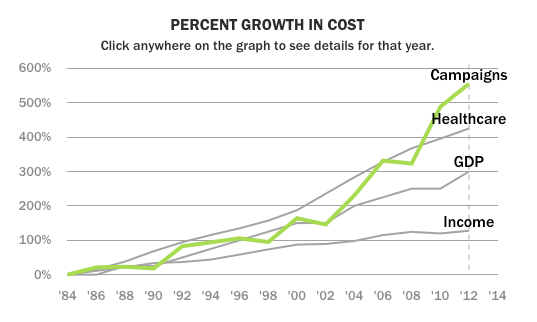Here's the Logic of A National Leader Who Wants MORE Money in Politics

By:
Campaign finance reform might not seem that interesting. Mere mention of it makes some people want to take a nap. Others see it, though, as the issue that trumps all issues. Lawrence Lessig started the Mayday PAC, the “Super PAC to end all Super PACs,” about a year ago for this reason. Lessig believes campaign finance, perhaps we'll redub it “purchase power,” is the root of all our problems. His Super PAC is aimed at electing politicians committed to ending what he sees as a system where politicians work for the highest bidder—instead of the public.
If money dictates the choices of politicians, reformers like Lessig see a situation where issues like climate change, foreign policy, and civil rights are guided by the profit margins of corporations with vested interests in those areas. Super PACs, for those who are unaware, are organizations that collect donations and use them to fund advertising and other efforts concerning political candidates or issues. Ever since the Supreme Court ruling in Citizens United v. Federal Election Commission in 2010 and the subsequent Speechnow.org v. FEC ruling in the Federal Court of Appeals for the D.C. Circuit, these groups have been able to accept vast amounts of money from donors, and it has elevated the amount of money spent in political campaigns.
Campaigns keep getting more expensive. According to Time, cost of running for Congress has increased over 500 percent since 1984—far past inflation rates:

h/t Time
David Keating, the president of the anti-regulation Center for Competitive Politics (CCP) and the person who spearheaded the Speechnow.org v. FEC case that brought Super PACs into existence, wants to take it a step further. Keating wants to see more purchase power in politics—a system with no limits.
“I actually invented the Super PAC,” Keating told me. “I was getting pretty frustrated with all these laws and regulations that made it really difficult to just have a bunch of us pool our money together and speak out to other Americans about who we think they should vote for.”
Keating didn't like that individuals were barred by law from giving his political nonprofit group SpeechNow more than $5,000 a year, so he led a lawsuit against the FEC, and his organization won the case. Political Action Committees (PACs) still have contribution limits, but the Super PACs that have largely taken their place have no limits at all. Organizations like this can raise an unlimited amount of money from individual donors, unions, or corporations.
Here is an interview Keating did with the Cato Institute:
Keating sees Lessig's efforts to limit the amount of money people can put toward political campaigns as limiting speech.
“I think his goals are profoundly misguided, but I support his right to speak out that way,” he said. When asked if allowing people with more money to express more speech is concerning, Keating said he sees no issue. “[Wealthy people] already have that ability, and they always will, and it's just the question of where the money will go and what outlet it will take. I mean, if we didn't have these Super PACs, I wouldn't be surprised if some people looking to buy influence would just buy the New York Times or something,” he said.
The CCP is continually making efforts, through various forms of litigation, to pull back the limits on campaign spending as far as possible. Beyond that, the group is suing California Attorney General Kamala Harris because of her efforts to make the organization share its unredacted copy of its donor list. They state a redacted version is publicly available, but they don't want to share the information of specific donors who might be less willing to donate if they knew they are going to be identified.
“I think there's general consensus that it's fine to require disclosure of contributions to candidates and political action committees that work for or against candidates and political parties,” Keating said. However, CCP is arguing that its status as a nonprofit means it simply has to disclose how much it's raised and how it was spent, not the personal information of donors.
All of this connects to what's sometimes called “dark money,” which Keating says is a “stupid” and “misleading” term. It's called dark money because it's money funneled into politics without a known origin.
“After Citizens United, nonprofit groups were allowed to speak out and tell voters, 'We think you should vote for this candidate or against that candidate,' and if the group is not a PAC, say it's a social welfare group like League of Conservation Voters or National Pro-Choice America, or whatever the name of the group is... or the National Rifle Associate, those groups can run those ads now,” he said. “As long as no one has given them money to run the ads, they don't have to report the average donor because they just spent the money out of their general budget.”
As Stephen Colbert famously illustrated with his Colbert Super PAC, he was legally allowed to set up a nonprofit that could collect donations that would be directed toward the Super PAC, making the nonprofit, which does not have to identify its donors, as the only major donor a to the Super PAC.
Keating said there should be no limits on campaign spending and that the “confusing” laws that dictate how groups can coordinate with politicians and how they run their campaigns should be discarded. He believes organizations should be able to run their campaigns as they see fit.
Whether someone sees money as a form of speech or believes money is just money, it is clear that the debate over how much a campaign should cost and who should be allowed to give how much is far from over. The country will either head toward more expensive elections with more billionaire donors, or the tide will roll back and politicians will run less extravagant campaigns.
